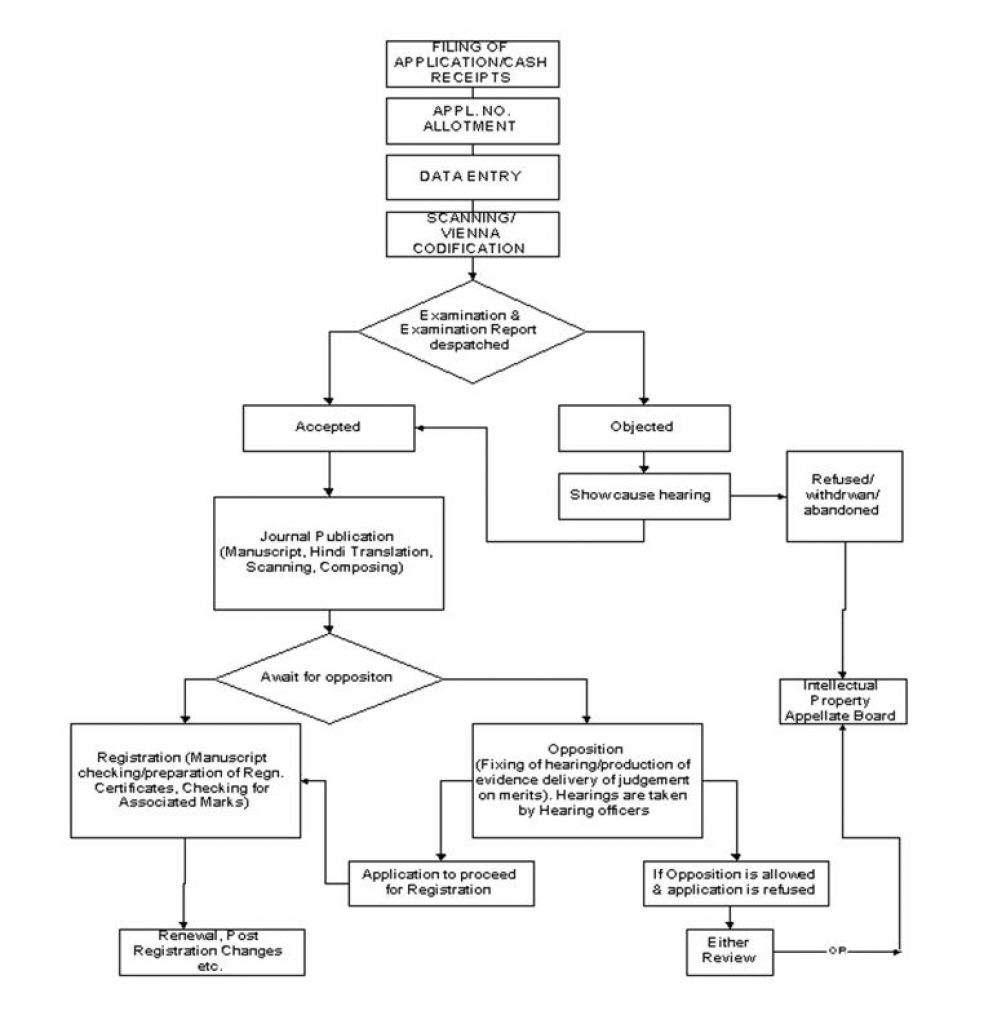Trade Mark Registration
Trademark Registration – Online Filing with Expert Help
A trademark is a visual symbol, which may be a word, name, device, label or numerals used by a business to distinguish it goods or services from other similar goods or services originating from a different business. A registered trademark is an intangible asset or intellectual property for a business and is used to protect the company’s investment in the brand or symbol. A trademark is registrable if it is distinctive for the goods and services you provide. Proposed trademarks that are similar or identical to an existing registered trademark cannot be registered. Also, trademarks are not registrable if it is offensive, generic, deceptive, not distinctive, contains specially protected emblems, etc.,
Trademarks in India are registered by the Controller General of Patents Designs and Trademarks, Ministry of Commerce and Industry, Government of India. Trademarks are registered under the Trademark Act, 1999 and provide the trademark owner with a right to sue for damages when infringements of trademarks occur. Once a trademark is registered, R symbol can be used and the registration will be valid for 10 years. Registered trademarks nearing expiry can be easily renewed by filing a trademark renewal application for a period of another 10 years
Trademark Registration Process
Trademark registration can be obtained for words, logo, numerals, slogan, device and more in India. Trademark registration provides a legal right of exclusivity for use of the mark to the owner of the trademark. Trademark registration is, however, a long process involving multiple steps. In this article, we cover the trademark registration process in India.
Trademark Filing
Once a trademark search is completed, the application for trademark registration can be filed with the Trademark Registrar. The application for registration of a trademark must be made in the prescribed manner and filed along with the fee for trademark registration. A trademark application can be filed at one of the five Trademark Registrar Office having jurisdiction over the State or online. Trademark applications can be filed online by SLG Prof Sol or a trademark agent or lawyer.
A trademark registration application must contain the following information:
- Logo or the Trademark
- Name and address of the trademark owner
- Classification or Trademark Class
- Trademark used since the date
- Description of the goods or services
Trademark Application Allotment
Once the Trademark registration application is filed with the Trademark Registrar, a trademark application allotment number is provided within one or two working days. The trademark application can also then be tracked online through the Online Trademark Search facility. Typically, on obtaining trademark application allotment number, the owner of the trademark can affix the TM symbol next to the logo.
Vienna Codification
The Vienna Classification or Vienna Codification, established by the Vienna Agreement (1973), is an international classification of the figurative elements of marks. Once the trademark registration application is filed, the Trademark Registrar will apply the Vienna Classification to the trademark based on the figurative elements of marks. While this work is in progress, the trademark application status usually reflects as “Sent for Vienna Codification”.
Trademark Examination
Once Vienna Codification is completed, the trademark registration application will be allotted to a Trademark Officer in the Trademark Registrar Office. The Trademark Officer would then review the trademark application for the correctness and issue a trademark examination report. The Trademark Officer has the ability to accept the trademark registration application and allow for trademark journal publication or object the trademark registration application.
If the trademark registration application is objected by the Trademark Officer, the trademark applicant has the right to appear before the Trademark Officer and address the objections. If the Trademark Officer is satisfied with the justifications of the trademark applicant, the trademark would be allowed for trademark journal publication. In case the Trademark Officer is not satisfied with the justifications, the trademark applicant has the right to appeal the decision of the Trademark Officer before the Intellectual Property Appellate Board.
Trademark Journal Publication
Once the trademark registration application is accepted by the Trademark Registrar, the proposed trademark is published in the Trademark Journal. The trademark journal is published weekly and contains all the trademarks that have been accepted by the Trademark Registrar. Once the trademark is published in the trademark journal, the public has an opportunity to object the trademark registration, if they believe they will be damaged by that registration. If there are no objections filed within 90 days of that publication, the mark will typically be registered within 12 weeks – months time.
If the trademark registration application is opposed by a third-party, hearing will be called for by the Trademark Hearing Officer. Both the trademark applicant and the opposing party have the chance to appear at the hearing and provide justifications for registration or rejection of the trademark application. Based on the hearings and the evidence presented, the Trademark Hearing Officer will determine if the trademark registration application should be accepted or rejected. The decision of the Trademark Hearing Officer can also be challenged by escalating to the Intellectual Property Appellate Board.
Trademark Registration
Once there are no objections or oppositions for the trademark registration application, the trademark manuscript and trademark registration certificate will be prepared and sent to the trademark application. Once the trademark registration certificate is issued, the trademark is considered to be a registered trademark of the owner, granting the trademark owner exclusive use of the mark. The ® symbol can now be placed next to the logo or trademark.
Trademark Registration Process Flowchart
Documents required for Trademark Registration
Trademark registration is an important mechanism through which a brand can be protected from unwanted use and infringement. Trademark registration process in India has been simplified by the Government and Entrepreneurs can now easily obtain trademark registration for their brands within a few months. In this article, we look at the documents required for obtaining trademark registration in India.
Note: During the trademark application process, there is no requirement for submitting original documents. Scan copy of the original document would suffice the requirement.
Individuals & Sole Proprietorship
Any individual – Indian National or Foreign National can easily register a trademark in India. There is no requirement for forming a legal entity or business entity to register a trademark. Further, the documents required to register a trademark in the name of a proprietorship are the same as that of an individual as under:
- Copy of the logo, preferably in black & white (Optional). In case the logo is not provided, the trademark application can be filed for the word.
- Signed Form-48. Form-48 is an authorization from the applicant to a Trademark Attorney for filing the trademark application on his/her behalf.
- Identity Proof of the individual or Proprietor.
- Address Proof of the individual or Proprietor.
Partnership / LLP / Company – Small Enterprise or Startup
The trademark registration fee varies from Rs.4500 to Rs.9500. For small enterprises, startups, proprietorships and individuals, the lower trademark fee of Rs.4500 is applicable. For all other entities, the trademark government fee applicable is Rs.9500. To be classified as a small enterprise, the applicant would have to provide Udyog Aadhar registration certificate. Further, in addition to the Udyog Aadhar registration, the following details would be required.
Partnership / LLP / Company
In the case of a partnership firm or LLP, the entrepreneur would have to submit the following:
- Copy of Logo (Optional)
- Signed Form-48.
- Udyog Aadhar Registration Certificate.
- Incorporation Certificate or Partnership Deed.
- Identity Proof of Signatory.
- Address Proof of Signatory.
Other Applicants
All other applicants, including companies that do not have Udyog Aadhar registration, will have to submit the following documents to obtain trademark registration in India.
- Copy of Logo (Optional)
- Signed Form-48.
- Incorporation Certificate or Partnership Deed.
- Identity Proof of Signatory.
- Address Proof of Signatory.






